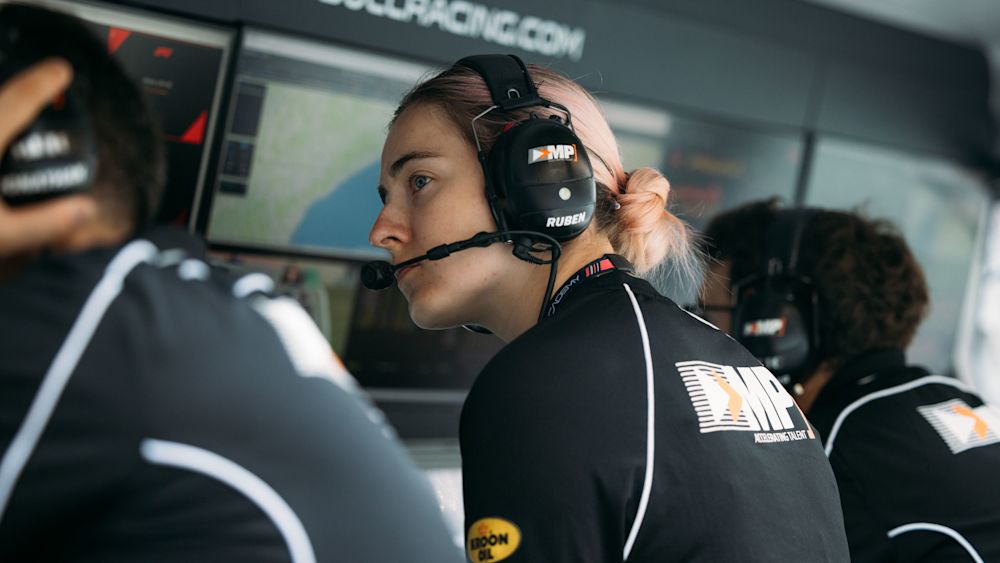Feature
Career Spotlight: Meet Charlotte Phelps, Race Engineer at MP Motorsport

Achieving success in motorsport is all about the team effort. From the most visible drivers to the engineers and mechanics working tremendously hard behind the scenes, their dedication is integral to bringing the track action to life, race in race out.
However, every pathway to the paddock is unique. As part of our Career Spotlight series, we’re highlighting one of those stories — Charlotte Phelps, Race Engineer at MP Motorsport.
Going from a placement student at the Mercedes-AMG PETRONAS Formula 1 Team to a graduate engineer and later a strategy engineer, Phelps was part of the squad that helped deliver six World Championship titles. Now in her second season in F1 ACADEMY engineering for Emely De Heus, we sat down with her to delve into all the key questions about her role.
WHERE DID YOU WORK BEFORE YOUR CURRENT ROLE?
“Before I worked in F1 ACADEMY, I was with W Series for two years and, before that, I was with the Mercedes F1 team.”
WHAT DID YOU STUDY AT SCHOOL OR UNIVERSITY AND HOW DID THAT HELP YOU ON YOUR CAREER PATH?
“At school, I did maths, further maths, physics and history. Then at university, I did an electronic engineering degree with music technology as a specialism. Actually, that specialism was what got me my role in Mercedes.
"My music technology specialism meant that I had a unique skillset in signal processing, and that I was different to all the other applicants. Mostly, it meant that I enjoyed my degree, which makes a very challenging subject much easier!”
HOW DO YOU PREPARE FOR A RACE WEEKEND BACK AT THE FACTORY?
“When we prepare for a race weekend, it’s all about learning from previous races. So, (we’re) looking at data and learning about what fuel consumption we might have, areas where drivers can improve, what kind of car setup we might want from previous races or from previous seasons where we've been to the same track. It's really just about learning from that history that we have to make sure that we're as prepared and as fast as possible.”

WHAT DOES AN AVERAGE WEEKEND LOOK LIKE AT THE TRACK?
“When we get to the track, generally on Wednesday or Thursday, we’ll set up the garage. So, we’ll unpack all the boxes, put everything in the garages and make everything look nice. Then, we’ll do a track walk and brief the drivers.
“Then Friday will be Practice, so we’re getting the drivers used to the circuit, learning what we need to know ready for the race sessions. Then we’re going to Qualifying, which is all about having the fastest lap. For that, it’s really about nailing all the details with both the drivers and with the car to make sure that we’re as fast as we can be.
“For the races, it’s about making sure the drivers understand the racecraft and the overtaking opportunities, as well as where they can defend (from) other people.”
WHAT ARE THE MOST IMPORTANT SKILLS YOU NEED?
“The most important skills as a Race Engineer are to be quick thinking, have good problem solving (skills) and be able to be really social — there's a lot of people interaction to do.”
DO YOU HAVE A FAVOURITE PART OF YOUR JOB?
“The winning! My favourite part is always the winning, but when the winning doesn’t come, I think it’s always seeing the smiles on people’s faces that motorsport can bring, seeing drivers improve and feel better (after) every session that they take part in.”
WHAT’S THE TOUGHEST ASPECT OF YOUR ROLE OR A CHALLENGE THAT PEOPLE MIGHT NOT EXPECT?
“The toughest aspect for me is always being away from home. I love travelling and I think people think it’s really glamorous, and that you’re away a lot and you see lots of places. But in reality, we only see the airport, the hotel and the racetrack. So, it can be really difficult to be away from home and not be around your friends and family, especially on a really tough day.”

ANY CAREER HIGHLIGHTS SO FAR?
“There’s so many, I’ve been fortunate to have a lot of good things in my career. I won six World Championships with Mercedes, then got to launch W Series, which was amazing. Then last year, winning a race with Emely was like the little cherry on top.”
IS THERE ANYONE IN MOTORSPORT WHO INSPIRED YOU OR SUPPORTED YOU?
“Weirdly, I look up to all women in motorsport. I think everyone has had their own battles to get where they are. I think there are a lot of men that are obviously role models because they are the most common people that we have around. But for me, I was fortunate to have my mum, who’s an engineer, who always encouraged me to pursue whatever I wanted to do and has always supported me however she can. Nothing’s ever been impossible because she’d already done it.”
WHAT’S BEEN THE FUNNIEST MOMENTS YOU’VE EXPERIENCED IN THE INDUSTRY?
“My most embarrassing moment is probably doing a dance with Emely on TV, which I probably shouldn’t have done. Also, singing Honey G on the radio on Sky F1 — probably shouldn’t have done either of those things (laughs)!”
WHAT ADVICE WOULD YOU GIVE TO YOUR YOUNGER SELF ABOUT EMBARKING ON A CAREER IN MOTORSPORT?
“Always follow what you enjoy. It's very easy to look at social media or what other people are doing and think ‘oh, that's the pathway to get there’. But actually, there are so many hundreds of pathways to get to any job. It's all about following what you enjoy doing and it will naturally lead you to the job you should be in rather than what you think you want to do.”